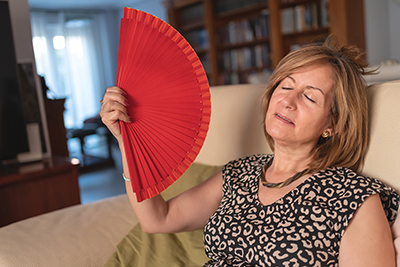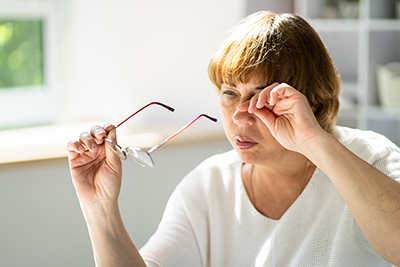Top 10 Most Common Symptoms of Perimenopause and Menopause
What is the first symptom you think of when you hear the word “menopause”? Is it hot flashes, night sweats, or mood changes? While all three are practically synonymous with this phase of life, we know now there are 103+ confirmed symptoms of perimenopause and menopause, according to research by my company, Morphus.
At the moment of writing, our “Signs & Symptoms Survey” has received 3,082 responses, so I wanted to share our latest research findings with you.
In our “Signs & Symptoms Survey,” we break down the results into three groups: those who are unsure what stage they are in (which represented 20% of the women), those who are in perimenopause, and those who are in menopause.
Here we go, beginning with number 10: these are the most common symptoms reported.
No. 10: Loss of or Low Libido
Your sex drive can take a vacay because of insomnia, depression, fatigue, stress, anxiety, and relationship issues with your partner. Perhaps you are experiencing vaginal dryness or painful sex as your vaginal walls become thinner. Urinary leakage can make your sex drive take a dive as well.
Speak to your doctor about checking your thyroid levels (a low libido is a symptom of low thyroid) and consider vaginal moisturizers, water-soluble lubricants, or topical estrogen if dryness is an issue for you. If stress is a factor, try meditation, yoga, deep-breathing exercises, and walks in nature to help regain your balance.
 No. 9: Hot Flashes
No. 9: Hot Flashes
I was personally surprised when I saw where hot flashes ranked on the symptoms list, because like many of us, I thought this one would rank at least in the top 5. Of all the women who filled out our survey, 57% experience them, and it goes to show us that there are other more common symptoms that aren’t as well-known. When we broke it down by category, we found the occurrence to be 50% among women who were unsure about their menopause status, 53% among those in perimenopause, and 65% among those in menopause.
Many steps can be taken to reduce the severity and annoyance factor of hot flashes including nutrition, lifestyle (managing stress and exercise), as well as supplements and hormones. For example, include foods in your diet which contain plant estrogens (e.g., flaxseeds, sour apples, organic tempeh, and chickpeas), practice stress-reducing yoga poses, dress in layers, and practice slow, deep breathing.
No. 8: Lack of Focus
Are you having difficulty focusing on conversations, work, reading, or other tasks? If you answered yes, you are not alone. The women who reported experiencing this side effect were 56% among women who were unsure what stage they are in, 58% among those in perimenopause, and 55% among those in menopause.
Focus is defined as where you choose to concentrate your attention. Therefore, it involves willpower and discipline. If you are reading and someone comes into the room and turns on the TV, focus is your will to pinpoint your attention on your book rather than on the TV. Lack of focus is an inability to reach or maintain the discipline it takes to stay focused. Some tips on how to maintain focus include keeping your blood sugar in balance, getting sufficient sleep, avoiding multitasking, practicing deep breathing throughout the day, and meditating.
No. 7: Lack of Concentration
Concentration is a critical ability because it helps to keep us safe and to learn, to analyze, and to enjoy life overall. It involves taking in information, processing it, and making decisions about how to act on it. When this process becomes challenging, it can be frightening and fill you with anxiety.
You can improve your ability to concentrate by incorporating a few habits into your lifestyle. For example, listen to white noise when performing tasks that involve concentration, get sufficient sleep (at least seven hours a night), eat foods containing phytoestrogens (e.g., yams, flaxseed, chickpeas, sesame seeds), minimize distractions, and keep a notebook or your device handy to take notes.
No. 6: Joint Pain
When two or more bones rub together or connect in some way that results in pain, it’s known as arthralgia. Any joint can fall into this category, but the most common one is the knee. As the levels of estrogen and other hormones decline, the chances of experiencing joint pain increases. Don’t let the pain and discomfort get you down!
Several lifestyle modifications can help you manage and even eliminate joint pain. Try following an anti-inflammatory diet (e.g., Mediterranean and dietary approaches to stop hypertension [DASH] are helpful), include turmeric or ginger in your food or as supplements, and try swimming, which is great exercise with minimal stress on your joints.
 No. 5: Anxiety
No. 5: Anxiety
Nearly 60% of respondents reported anxiety as a common symptom for them. Anxiety can be characterized by both emotional and physical symptoms, including sweating, high blood pressure, and elevated heart rate, along with heightened uneasiness, tension, worrying, and overwhelming apprehension. For many of us, anxiety can appear at this stage, or it can become heightened.
Although anxiety can sometimes feel overwhelming, many things can be done to bring these feelings under control. This could include daily meditation, gentle yoga, one to two minutes of deep-breathing sessions throughout the day, getting sufficient sleep, whole-food nutrition, setting boundaries, and practicing affirmations every day.
 No. 4: Memory Lapse
No. 4: Memory Lapse
Do you walk out of a room and forget what you were going to do? Do you misplace your keys, handbag, or cell phone, or forget where you parked your car? Do you sometimes have to reread a paragraph several times? Forget your friend’s name? Yep, all these situations and scores happen more to women in menopause, as you have told us! In fact, 62% of women in perimenopause and menopause report having this symptom.
The good news is that memory hiccups are usually temporary. In fact, once the fluctuating and declining estrogen levels even out, you will likely return to your premenopausal memory activity. However, you can do some things to exercise your memory to reduce those lapses: get sufficient sleep; eat foods rich in omega-3 fatty acids; take an omega-3 supplement; and incorporate relaxation techniques into your lifestyle, such as yoga, meditation, spending time with people you love, and deep breathing.
No. 3: Sleep Problems
Morphus readers reported different reasons for their sleep issues. Overall, nearly two-thirds (66%) talked about difficulty falling asleep or staying asleep, waking up multiple times, waking up feeling tired, and more. The number one reason women wake up during the night is because of stress, so managing it is crucial for getting a better night’s sleep.
Fortunately, in addition to managing stress levels, we can offer many suggestions on how to best deal with and overcome those sleep problems. Since adequate sleep is such a critical part of good health, it’s important to make sleep a priority and focus on sleep hygiene. This could include taking a magnesium-bisglycinate supplement before bed; practicing relaxation techniques in the evening such as deep breathing, meditation, progressive relaxation, or visualization; and drinking passionflower or chamomile tea before going to bed, if you can tolerate liquids in the evening.
No. 2: Brain Fog
Just like foggy weather is characterized by mistiness and difficulty seeing or understanding what you are seeing, brain fog is a condition that involves difficulty with mental clarity, memory, concentration, and focusing. Fortunately, in most cases, brain fog, like foggy days, eventually dissipates and thinking becomes clearer and normal.
Brain fog is caused by changes in levels of estrogen, progesterone, follicle-stimulating hormone, and luteinizing hormone. When the levels fluctuate, so can your cognitive abilities. If brain fog is moving in on you, try some coping techniques. For example, incorporate more physical activity into your lifestyle to boost blood flow in your brain, learn new skills or solve puzzles, and focus on whole foods and omega-3 fatty acids, which nourish the brain.
 No. 1: Fatigue, No Energy
No. 1: Fatigue, No Energy
Feeling like you lost your mojo? Has your get-up-and-go gone away? Are you dragging your feet all day? The number one complaint among Morphus readers and followers is fatigue and lack of energy. It is more common in perimenopause than menopause, as our bodies are going through the transition.
Fatigue is a symptom that seems to creep into your bones and take over your life, leaving you to feel like a “wet rag,” according to some readers who took our survey. The good news is that it usually doesn’t last forever and that there are numerous natural ways to remedy it.
In some cases, you should probably talk with your health-care practitioner if various attempts to relieve your persistent tiredness don’t work. However, here are some ways to bring fatigue under control: get adequate sleep (7–8 hours nightly); meditate to help reduce stress and fatigue; consider adaptogenic herbs such as ashwagandha; stay well-hydrated throughout the day; and reduce stress by practicing deep breathing, yoga, or meditation.
Bottom Line
Always speak to your doctor if you feel like something is off or unusual. Once you get a clean bill of health, you can look to nutrition, lifestyle, and supplements to help you manage your symptoms. If you have not already filled out our survey, please do so by going to wearemorphus.com/menopause-research.
Andrea Donsky, RHN
Andrea Donsky is a Registered Holistic Nutritionist and founder of NaturallySavvy.com—a multiple award-winning website. She has 21 years of experience in the health and wellness space, and is a multiple award-winning influencer. Her newest venture—wearemorphus.com—helps women in perimenopause and menopause. Follow Andrea on TikTok and Instagram @andreadonsky.
naturallysavvy.com

 Stores
Stores
